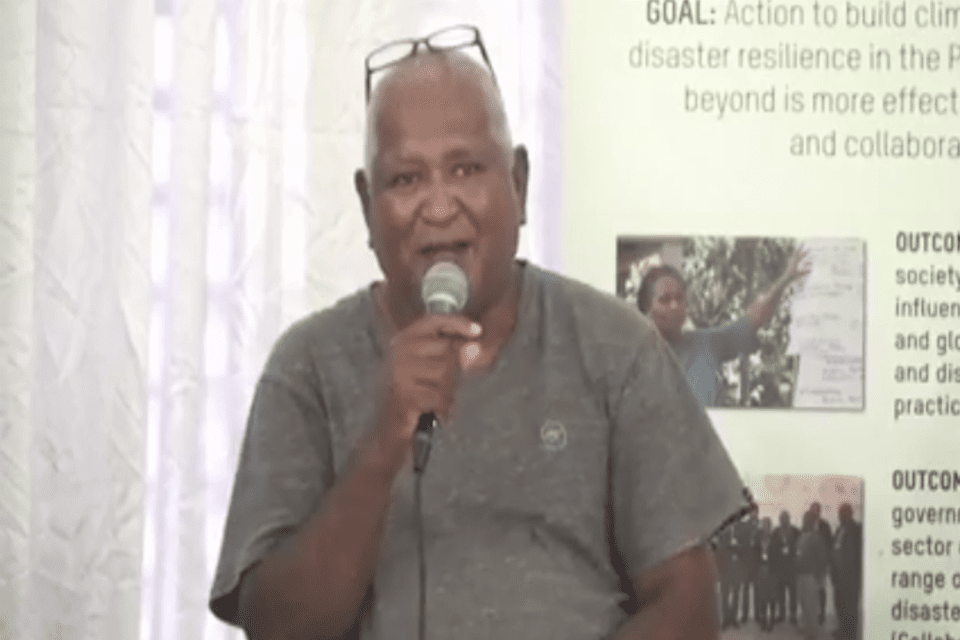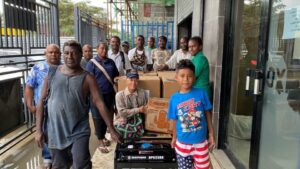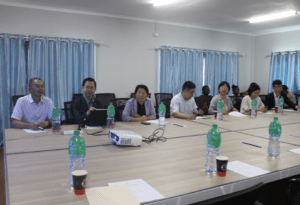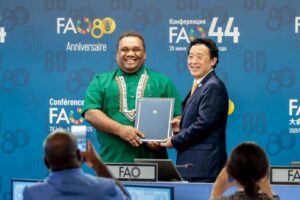BY JOHN HOUANIHAU
DR. Morgan Wairiu has urged Solomon Islanders to start writing climate change stories in international journals.
Dr. Wairiu who also has a broad knowledge of Pacific regions’ environment and development issues including Government structures and systems both at national and community levels said to better respond to the challenges of climate change, Solomon Islanders should start writing their own stories to present in international journals.
He said using local stories to identify climate change is more likely to convince individuals that climate change is happening in the Solomon Islands, unfortunately, local stories that can stimulate more support for climate action have been done in the country.
“It is hard to see any research that contains credible data on Climate change loss and damages in the Pacific.
“Small Island Developing States, such as the Solomon Islands, are among those affected earliest and most by the effects of climate change, despite their contributions to less than 1 percent of the world’s total greenhouse gas emissions.
“Sea level rise coupled with more frequent and intensive extreme weather events, such as tropical cyclones, directly affect the food security, livelihoods, health and well-being of the local populations,” Dr. Wairiu pointed out when speaking at this month’s Climate Justice and Symposium Dialogue held in Honiara.
As a Solomon Islands representative and an author of the United Nation’s Intergovernmental Panel on Climate Change (IPCC), Special Report on 1.5 degrees and the ‘small islands’ chapter of the IPCC Working Group II Sixth Assessment Report, Dr. Wairiu said that he is not talking about technical reports or project reports as those are not recognized by the IPCC.
“There are so many project reports, field visit reports, survey data collection but that information and data are locked up in what is called the grey literature that doesn’t go through a robust and scientific peer-reviewed system that can become credible for use.
“It’s not an issue of having no capacity to write reports on the ground. There are 100 reports but since IPCC is the scientific body over Climate Change, it does not require to use of grey literature information,” Dr. Wairiu said.
Environment Media understands that countries build policy responses to tackle climate change based on the finding of IPCC reports.
He said IPCC is only allowed to use information and data from published literature inside journals.
“So when I search for published literature on loss and damage in whole small islands including Caribbean, Pacific, Indian Ocean, some islands in Eastern Africa I only came across 28 published book.
“You cannot make a certainty decision out of 28 papers, you need at least 100 published articles that are our real problem. To inform the scientific community and policy decision-makers about our situation we need good evidence,” Dr. Wairiu said.
The Intergovernmental Panel on Climate Change’s (IPCC) recent report on oceans (External link) states that the oceans’ response to global climate change threatens human communities living in coastal environments and small islands, which are home to 65 million people.
He said they invite people across the Pacific to work from their countries and dig deep into whatever reports to put together and put them into publication.
He said they already contracted Oxford University Press, one of the top publishing companies in the world to publish the report and it is scheduled to be published in 2025.
“35 Fijian are involved, Samoa 28, Tonga 15, Solomon Islands 1,’’ Dr. Wairiu noted.
He said once it is published then it means our voices enter the IPCC forum and inform the key policymakers, but in our case now, our voices do not have good credible data that IPCC can consider.
“Because every decision and policymakers and people making policies rely on the IPCC the body they packed their decisions on and if nothing comes through IPCC nothing would happen,’’ he said.
Dr. Morgan Wairiu obtained his Ph.D. in Environmental Soil Science from Ohio State University in the USA and his Master of Science from Aberdeen University in Scotland.
He is also the Acting Director of the Pacific Centre for Environment and Sustainable Development (PaCE-SD) at the University of the South Pacific (USP) and manages the Centre’s Research & Teaching across the university’s faculties, schools, institutes and centers, and USP regional campuses as well as national, regional governments and international development partners and across the NGOs, CSO and community sectors.
Dr. Wairiu’s research interest is in climate change adaptation and risk assessment and management. With a career spanning more than three decades, He has extensive experience in environment and sustainable development across the Pacific Islands Countries.




